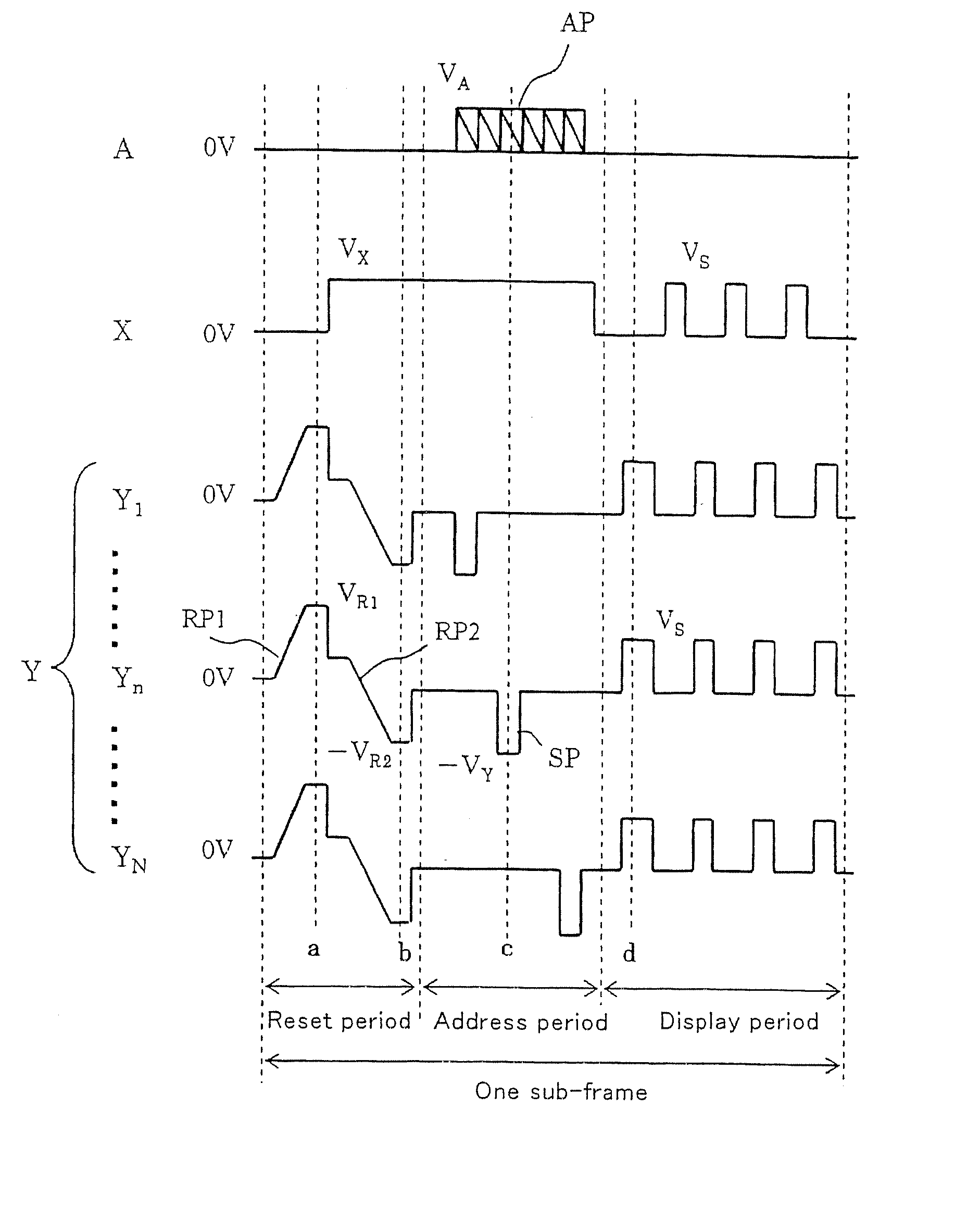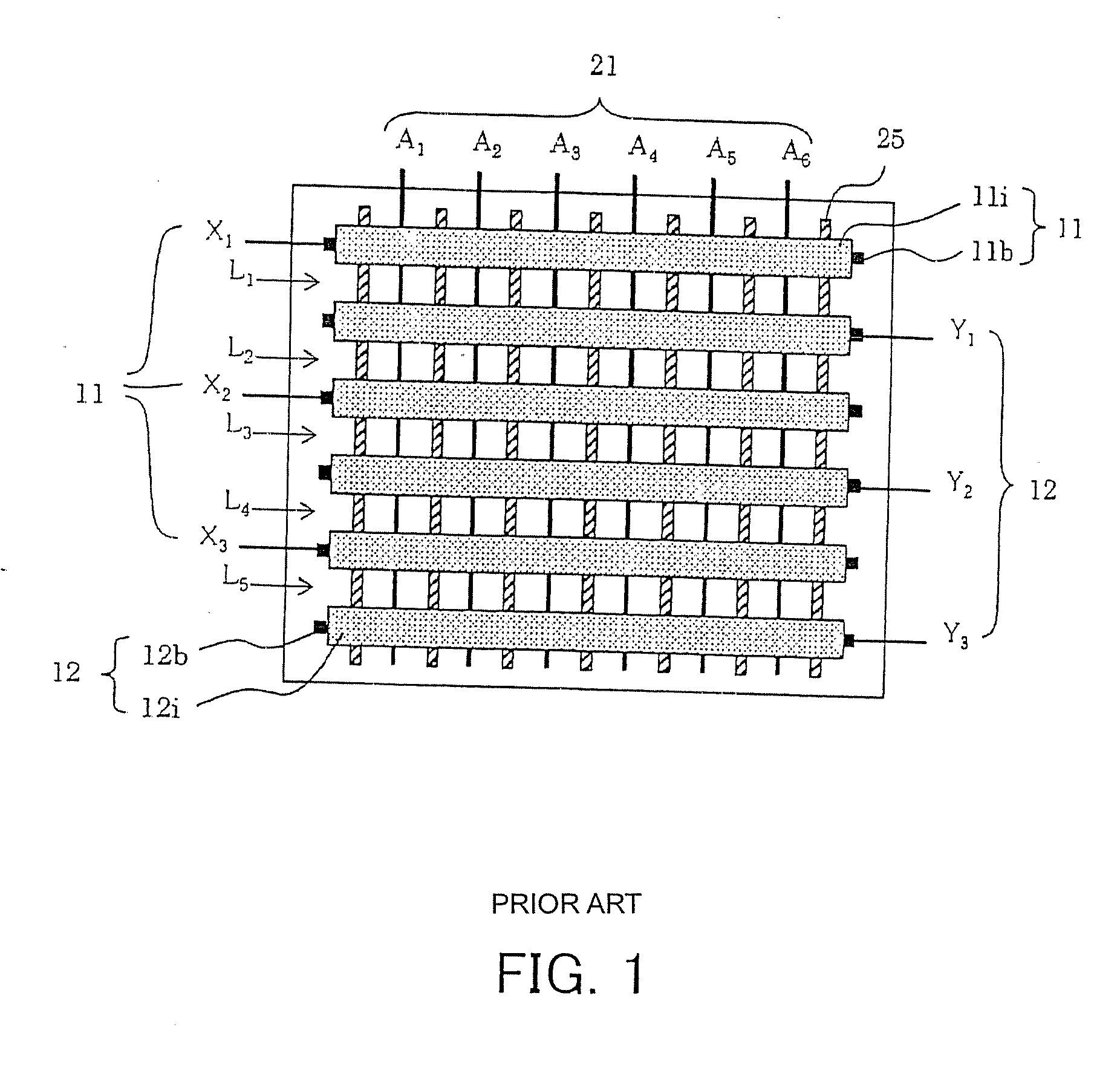Plasma display apparatus and method of driving a plasma display panel
a plasma display panel and plasma display technology, applied in the direction of instruments, static indicating devices, etc., can solve the problems of reducing the brightness or resolution of the image displayed by the pdp, and achieve the effects of high brightness, high resolution, and large operating margin
- Summary
- Abstract
- Description
- Claims
- Application Information
AI Technical Summary
Benefits of technology
Problems solved by technology
Method used
Image
Examples
first embodiment
[0088] Referring to FIGS. 4 to 14, a structure of a PDP and a method of driving it, according to a first embodiment of the present invention, are described below.
[0089]FIG. 4 is a plan view showing the structure of the PDP according to the first embodiment, and FIG. 5 is an exploded perspective view thereof.
[0090] In FIGS. 4 to 40, X1 to X3 denote display electrode pairs 11, Y1 to Y3 denote scanning electrode pairs 12, and A1 to A6 and 21 (FIG. 5) denote address electrodes. Although rather small numbers of electrode pairs are shown in those figures for the purpose of convenience representation, a practical PDP includes great numbers of electrode pairs. Each of the display electrode pairs 11 and also each of the scanning electrode pairs 12 include two electrodes. In the example shown in FIG. 5, two electrodes 11α and 11β form an electrode pair X1, and two electrodes 12α and 12β form an electrode pair Y1. Each electrode of any electrode pair is formed of a transparent electrode and ...
second embodiment
[0143] The technique disclosed above in the first embodiment can be used to display a high-resolution image of a general pattern. However, when a special pattern is displayed, degradation in resolution can occur. A second embodiment of the present invention provides a driving technique which makes it possible to display a high-resolution image even for such a special pattern.
[0144] First, when such a special pattern is displayed, what occurs with the first embodiment is described with reference to FIGS. 15A, 15B, 16A, 16B and 16C.
[0145]FIGS. 15A and 15B show the method of turning on / off cells according to the first embodiment, in which cells are grouped such that two cells adjacent in the vertical direction to each other are grouped together, and two cells in each group are simultaneously turned on or off, wherein grouping of cells is shifted by one cell in the vertical direction between the frame (as shown in FIG. 15A) and the odd frame (as shown in FIG. 15B).
[0146] When display...
third embodiment
[0222] In the first and second embodiments described above, the driving waveforms used in the display period are opposite in phase between X electrode pairs and Y electrode pairs, while the driving waveforms applied to any X electrode pair are the same in phase and the driving waveforms applied to any Y electrode pair are also the same in phase. This causes the display discharge to occur simultaneously in all cells, which results in a high peak discharge current. This is undesirable from the point of view of the operation margin and also the load imposed on the driver. Furthermore, the large discharge current results in large electromagnetic radiation.
[0223] To avoid the above problems, driving waveforms shown in FIG. 34 are employed. As shown in FIG. 34, four different driving pulses are applied to four types of electrode pairs Xodd, Yodd, Xeven, and Yeven, respectively. For ease of understanding of the locations at which discharges occurs, a driving pulse applied to one additiona...
PUM
 Login to View More
Login to View More Abstract
Description
Claims
Application Information
 Login to View More
Login to View More - R&D
- Intellectual Property
- Life Sciences
- Materials
- Tech Scout
- Unparalleled Data Quality
- Higher Quality Content
- 60% Fewer Hallucinations
Browse by: Latest US Patents, China's latest patents, Technical Efficacy Thesaurus, Application Domain, Technology Topic, Popular Technical Reports.
© 2025 PatSnap. All rights reserved.Legal|Privacy policy|Modern Slavery Act Transparency Statement|Sitemap|About US| Contact US: help@patsnap.com



